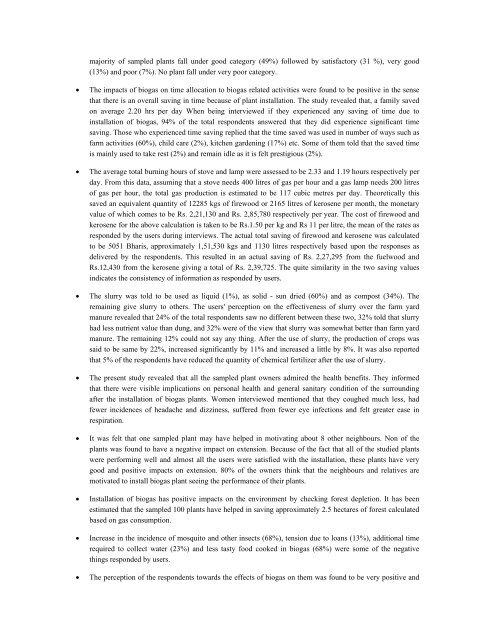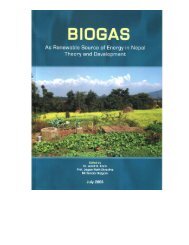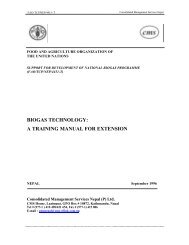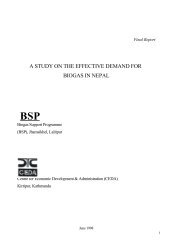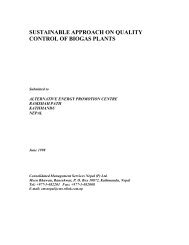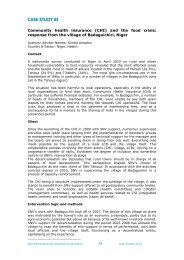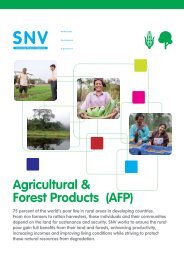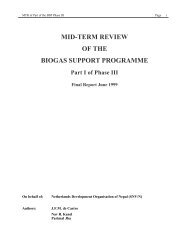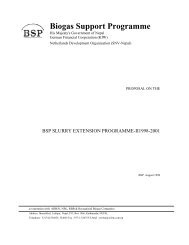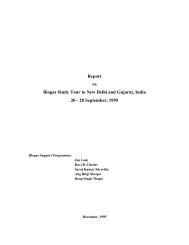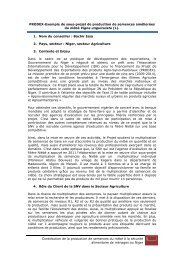download (pdf, 11MB) - SNV
download (pdf, 11MB) - SNV
download (pdf, 11MB) - SNV
Create successful ePaper yourself
Turn your PDF publications into a flip-book with our unique Google optimized e-Paper software.
majority of sampled plants fall under good category (49%) followed by satisfactory (31 %), very good<br />
(13%) and poor (7%). No plant fall under very poor category.<br />
• The impacts of biogas on time allocation to biogas related activities were found to be positive in the sense<br />
that there is an overall saving in time because of plant installation. The study revealed that, a family saved<br />
on average 2.20 hrs per day When being interviewed if they experienced any saving of time due to<br />
installation of biogas, 94% of the total respondents answered that they did experience significant time<br />
saving. Those who experienced time saving replied that the time saved was used in number of ways such as<br />
farm activities (60%), child care (2%), kitchen gardening (17%) etc. Some of them told that the saved time<br />
is mainly used to take rest (2%) and remain idle as it is felt prestigious (2%).<br />
• The average total burning hours of stove and lamp were assessed to be 2.33 and 1.19 hours respectively per<br />
day. From this data, assuming that a stove needs 400 litres of gas per hour and a gas lamp needs 200 litres<br />
of gas per hour, the total gas production is estimated to be 117 cubic metres per day. Theoretically this<br />
saved an equivalent quantity of 12285 kgs of firewood or 2165 litres of kerosene per month, the monetary<br />
value of which comes to be Rs. 2,21,130 and Rs. 2,85,780 respectively per year. The cost of firewood and<br />
kerosene for the above calculation is taken to be Rs.1.50 per kg and Rs 11 per litre, the mean of the rates as<br />
responded by the users during interviews. The actual total saving of firewood and kerosene was calculated<br />
to be 5051 Bharis, approximately 1,51,530 kgs and 1130 litres respectively based upon the responses as<br />
delivered by the respondents. This resulted in an actual saving of Rs. 2,27,295 from the fuelwood and<br />
Rs.12,430 from the kerosene giving a total of Rs. 2,39,725. The quite similarity in the two saving values<br />
indicates the consistency of information as responded by users.<br />
• The slurry was told to be used as liquid (1%), as solid - sun dried (60%) and as compost (34%). The<br />
remaining give slurry to others. The users' perception on the effectiveness of slurry over the farm yard<br />
manure revealed that 24% of the total respondents saw no different between these two, 32% told that slurry<br />
had less nutrient value than dung, and 32% were of the view that slurry was somewhat better than farm yard<br />
manure. The remaining 12% could not say any thing. After the use of slurry, the production of crops was<br />
said to be same by 22%, increased significantly by 11% and increased a little by 8%. It was also reported<br />
that 5% of the respondents have reduced the quantity of chemical fertilizer after the use of slurry.<br />
• The present study revealed that all the sampled plant owners admired the health benefits. They informed<br />
that there were visible implications on personal health and general sanitary condition of the surrounding<br />
after the installation of biogas plants. Women interviewed mentioned that they coughed much less, had<br />
fewer incidences of headache and dizziness, suffered from fewer eye infections and felt greater ease in<br />
respiration.<br />
• It was felt that one sampled plant may have helped in motivating about 8 other neighbours. Non of the<br />
plants was found to have a negative impact on extension. Because of the fact that all of the studied plants<br />
were performing well and almost all the users were satisfied with the installation, these plants have very<br />
good and positive impacts on extension. 80% of the owners think that the neighbours and relatives are<br />
motivated to install biogas plant seeing the performance of their plants.<br />
• Installation of biogas has positive impacts on the environment by checking forest depletion. It has been<br />
estimated that the sampled 100 plants have helped in saving approximately 2.5 hectares of forest calculated<br />
based on gas consumption.<br />
• Increase in the incidence of mosquito and other insects (68%), tension due to loans (13%), additional time<br />
required to collect water (23%) and less tasty food cooked in biogas (68%) were some of the negative<br />
things responded by users.<br />
• The perception of the respondents towards the effects of biogas on them was found to be very positive and


